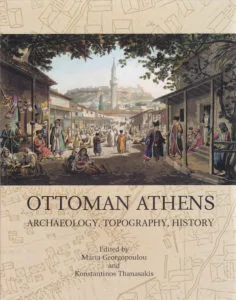Approaching Ottoman Athens
Author: Maria Georgopoulou
17 July 2020

The Gennadius Library and the Aikaterini Laskaridis Foundation have published Ottoman Athens. Archaeology, Topography, History, a collection of essays edited by Maria Georgopoulou and Konstantinos Thanasakis.
Pulling together sources that highlight unknown facets of Ottoman Athens, piecing together little-known accounts and archaeological artifacts alongside better-known engravings and European travelogues, this volume encourages us to take a fresh look at early modern Athens from 1460 to 1827.
True to its celebrated Classical heritage, the Acropolis of Athens and its antiquities held center stage in travelogues and sketches, but also in the imagination of travelers and locals, as well explained by George Tolias. Tasos Tanoulas uses his intimate knowledge of the monuments on the Acropolis to describe its complex building history based on European accounts.
Elizabeth Key Fowden traces the complicated history of the Parthenon in the eyes of the Ottomans based on the description of the city in the Seyahatname (‘Book of Travels’) by Evliya Çelebi. Tracing the genealogy of the chronicle of Mahmud Efendi on ancient Athens written in Ottoman Turkish under the title Tarih-i Medinetü’l-Hukema (‘History of the City of Philosophers’), Gülçin Tunalı places this text into a local tradition related to the city of Athens and stresses the interaction of Ottoman and Greek cultures.
The careful consideration of urban planning by Dimitris Karidis provides a rich canvas of the city’s topography, which was well-equipped architecturally, as the essays by Eleni Kanetaki and Yannis Kizis make clear. It was endowed with mosques and a madrasa (next to the Tower of the Winds), as well as hammams, fountains, fine residences for the wealthy residents, simple houses for the garrison on the Acropolis, and churches and monasteries, both Orthodox and Latin. Reports of Europeans on the hammams, presented by Aliki Asvesta and Ioli Vingopoulou, provide voyeuristic, if comical, references to an exotic culture in which bathing was a normal pastime and ritual for locals of every confession.
The Ottoman material unearthed in the excavations of the Athenian Agora confirms the vibrancy of the busy marketplace, so vividly portrayed by Edward Dodwell on the cover of the book. The pottery, published here for the first time as a group by Joanita Vroom, showcases local production, as well as imports from Italy and Turkey. The clay pipes and coffee cups bring to light important customs associated with the Ottomans at the time.
Finally, a look at archival material from Istanbul offers some correctives and new perspectives. The topography of the city on the eve of the Greek War of Independence is made palpable by a newly discovered Ottoman map from the Ottoman State Archives in Istanbul, presented here by Katerina Stathi. Hidden moments in the history of the infamous despoliation of the Parthenon by Lord Elgin are fleshed out in the archival research of Elena Korka and Seyyed Mohammad Taghi Shariat-Panahi. Şükrü Ilıcak brings to the fore new archival materials from the Archives in Istanbul that bear upon the siege of the Acropolis during the Greek War of Independence.
Bibliographical information:
Maria Georgopoulou, Kōnstantinos Thanasakēs (eds.): Ottoman Athens: Archaeology, Topography, History. Athens: Gennadius Library of the American School of Classical Studies at Athens, 2019.
Maria Georgopoulou is currently Director of the Gennadius Library at the American School of Classical Studies in Athens. Dr. Georgopoulou contributed to the workshop ‘The Traveler’s Voice: Approaches and Reflections on Travel Literature’ (10 December 2019), organized within the Orient-Institut’s research field History and Life Narratives, with a presentation on ‘The wonders that illumined Greece. European travelers’ books in Greek collections.’
Citation: Georgopoulou, Maria. “Approaching Ottoman Athens,” Orient-Institut Istanbul Blog, 17 July 2020, https://www.oiist.org/approaching-ottoman-athens/